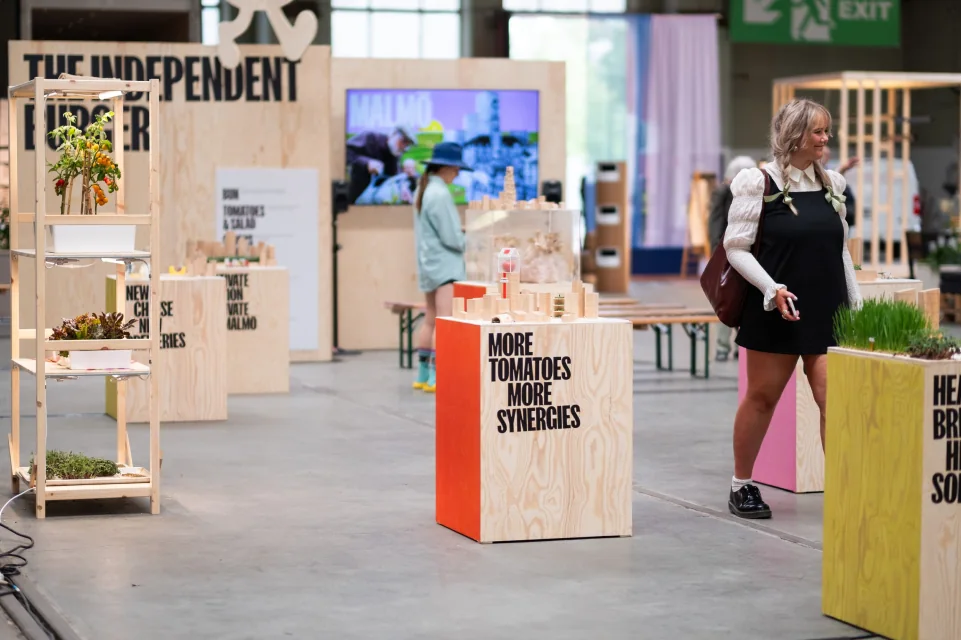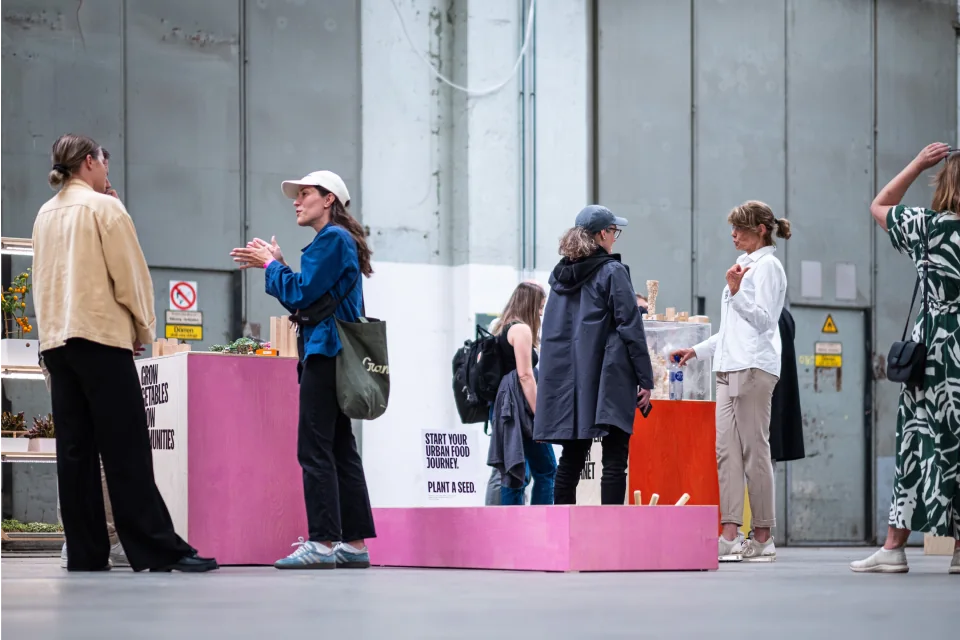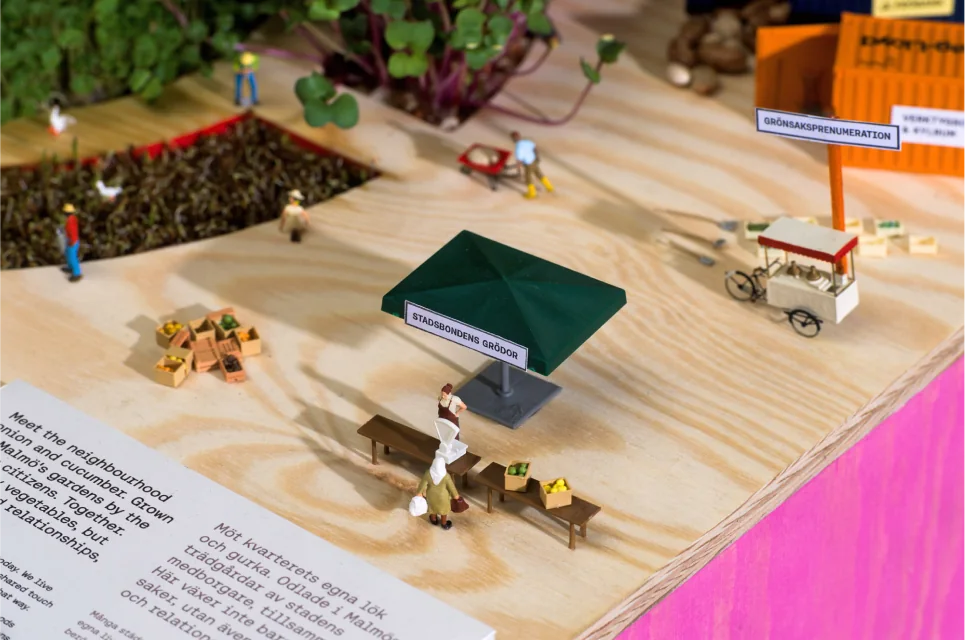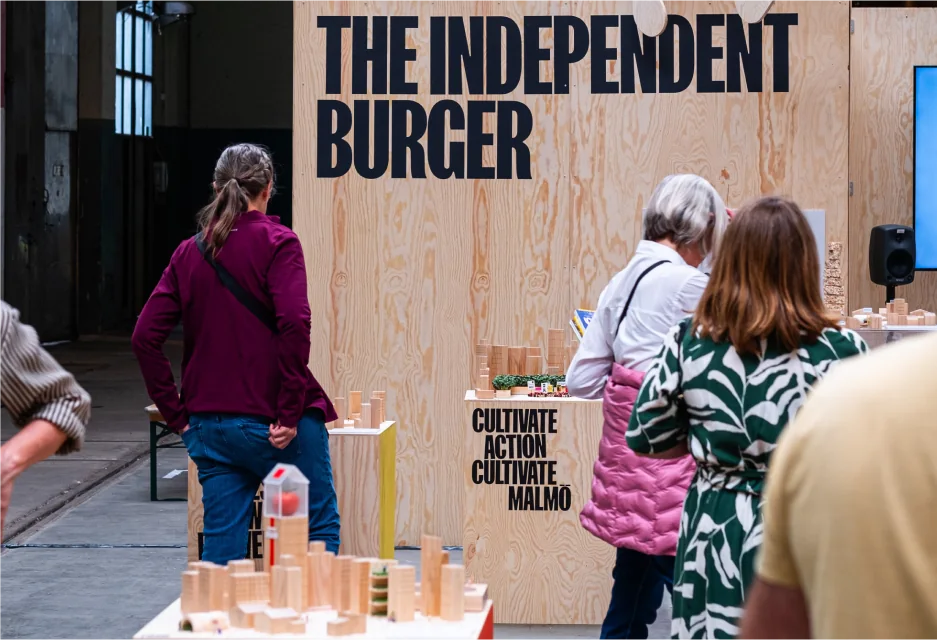Soil health is rapidly declining in most of the world's agricultural lands. Malmö can contribute to the solution by applying regenerative farming practices for healthy soils, such as maximizing crop diversity, minimizing soil disturbance, and ensuring that soils are covered year-round.
Malmö
urban food
revolution





In May 2024, we launched an exhibition showcasing Malmö’s future food city — a city designed to be greener, healthier, tastier, and better prepared for the future.
Explore the vision, download the report, and join our call to action.
Explore a vision of a future food city

Today, urban life is completely removed
from the origin of food.
Supermarkets with year-round rows of perfect tomatoes
life farmed in factories
and cheap, faceless fast-food deliveries.






Cities dependent on an industrial food system built on
short-sighted
shortcuts -
a food system on the brink of collapse
But, another city is possible
If we work for it, Malmö could become a pioneering food city that reconnects us with food and
shows that this is not only a necessary shift, but that it is possible and desirable.
However, we cannot build what we cannot imagine, so what could the future food city of Malmö look
like? Here we outline our vision across six key areas of change and invite you to explore them.
Bring soils
to life
Yttre och Inre Ringvägen
In the near future, organic climate-resilient crops could be cultivated on the outskirts of Malmö, for example, in the fertile soil between Yttre and Inre Ringvägen. Healthy soil works wonders. It retains water, withstands drought, sequesters carbon dioxide, helps mitigate climate change, and provides delicious and nutritious food.
Grow relationships
Rosengård
Many cities are anonymous. We live our own lives with far too few shared touchpoints. But it doesn't have to be that way. — In the food city of Malmö, neighborhoods across the city, like Rosengård, come alive through more community gardens and farms. Places where people meet and form bonds. The food is closer to us, and we are closer to each other.
In communal gardens people grow food together, and become better neighbours. Interestingly enough, research shows that a shared vegetable plot is more productive than if it is cultivated by a single person. Working together delivers better results, and it is more fun.
Leverage the unused
Fosie
In the food city, what is discarded today creates something new tomorrow. Waste is turned into value, and underutilized rooftops, garages, and industrial complexes are turned into indoor farms for year-round food production. In the future food city, even densely built urban areas contribute to the city's sustenance.
In this future Malmö, many apartment blocks will have installed equipment for growing food in the leftover spaces of their buildings. Unused storage space and bicycle rooms have vertical hydroponic gardens and mushroom farms. Neighbors bump into each other on their way to harvest.
Nurture a protein shift
Nyhamnen
The Earth's growing population cannot continue consuming meat to the extent that we do today. New production technologies create nutritious foods and proteins in a future sustainable city, which produces and processes much of its food. Myco-proteins from mushrooms, meat from legumes and yeast, fish from seaweed and algae, and cheese from organic oats are on the menu in the future food city.
The future food city will offer culinary experiences of plant-based foods that go beyond the expectations of die-hard meat eaters, helping to sway difficult-to-change eating habits.
Enable new tech
Södra innerstaden
In the future food city of Malmö, technology enables urban food production. Here, new plant-based proteins, algae and mushroom-based products, and real dairy products (like cheese, but without the cow) are grown using ancient new fermentation methods. Food lovers meet with science lovers in lab-like breweries to create new low-impact foods based on locally available organic crops and clean ingredients.
In the city’s food tech park, producers gain strength by sharing R&D facilities and production equipment. This bioreactor farm makes it easier to innovate, launch, and scale new novel foods. It allows different actors to collaborate to find ways of turning local resources into healthy, low-impact foods.
Cultivate action
Stortorget
Passionate individuals and enthusiasts are already working to make Malmö greener and more resilient. A world-leading food city could become a reality, but it needs your help. Courageous decisions are necessary to build the food city of Malmö — grand visions that come to life through small concrete steps. Citizens joining hands with businesses and politicians, creating conditions for development. A concerted effort with all of the good forces in the city. It’s time to act!
Change starts with each one of us, and we can all do something to help our city. Why not plant vegetables? And if you’re already growing them, why not plant more? Or talk to your neighbors about transforming that big grassy lawn outside the building into a lush and tasty garden.




About the exhibition
We cannot build something that we cannot imagine. This is why we created an exhibition showcasing this vision for what the future food city of Malmö can look like. The exhibition was first displayed at Southern Sweden Design Days in May 2024 and has since been shown at other venues. In it, we show that an urban food system is not only necessary but also possible and desirable.
We want to thank everyone who collaborated with us on the exhibition and Souther Sweden Design Days for being such a lovely host and venue.
Why an urban food revolution
We have chosen to work with Malmö as a pioneer city to develop a large-scale urban food system that makes the city greener, healthier, tastier, and more prepared for the future. But an urban food revolution can happen all across the world. A majority of the global population lives in urban areas, which have become disconnected from that most fundamentally human: food.
Our cities must become more self-sufficient and reconnect their people with where food comes from. We believe Malmö can lead the way and show that it is not only possible but awesome.
About the initiative
This is an initiative by Plattform STAD — an innovation platform for urban food systems, with funding from Vinnova, the Swedish innovation agency.
Plattform STAD is organized by Malmö Stad, Innovation Skåne, Region Skåne, and EY Doberman with the future manifestation lab SALLY.
Contact
Kristoffer Lundholm
Head of Sustainability, SALLY
kristoffer.lundholm@doberman.ey.com
Tove Blomgren
Creative Director, SALLY

We cannot build something that we cannot imagine. This is why we created an exhibition showcasing this vision for what the future food city of Malmö can look like. The exhibition was first displayed at Southern Sweden Design Days in May 2024 and has since been shown at other venues. In it, we show that an urban food system is not only necessary but also possible and desirable.
We want to thank everyone who collaborated with us on the exhibition and Souther Sweden Design Days for being such a lovely host and venue.
Contact
Kristoffer Lundholm
Head of Sustainability, SALLY
kristoffer.lundholm@doberman.ey.com
Tove Blomgren
Creative Director, SALLY






















